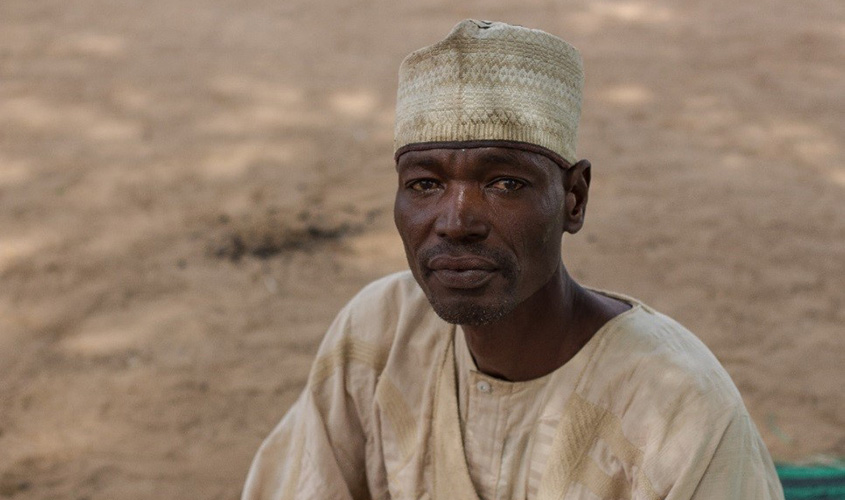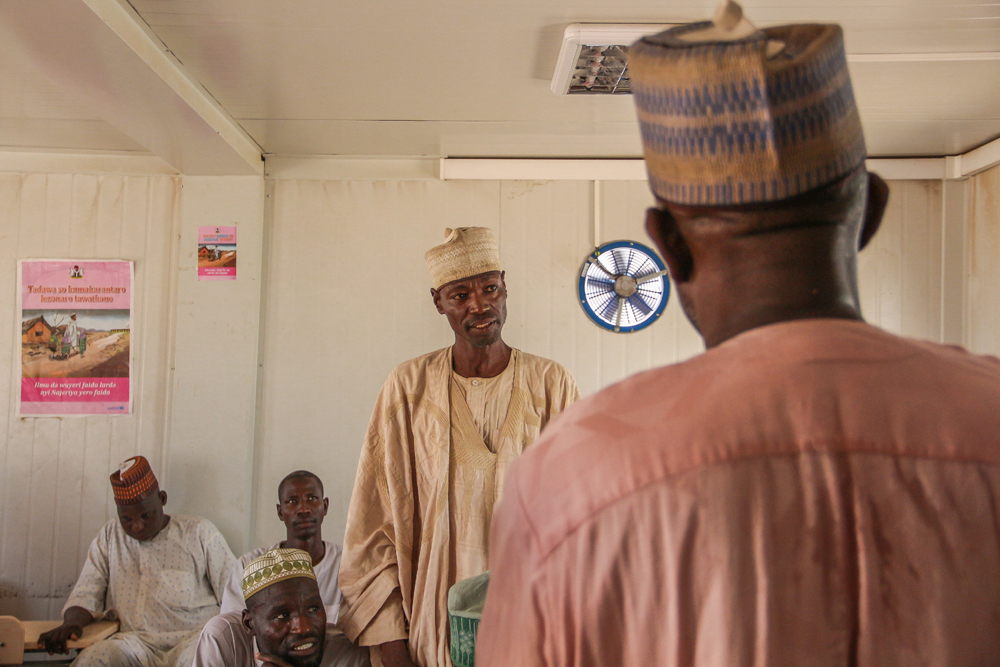Life after Boko Haram: Abdullahi's story
Women and girls returning from captivity by the insurgency group Boko Haram often face stigma and rejection in their own communities, found a recent study by International Alert and UNICEF.
But thanks to our dialogue workshops, this is beginning to change.
Read the story of Abdullahi, who used to be afraid of former Boko Haram captives, but has learned to accept them and is urging others to do the same.
Abdullahi’s story

“They had burnt our houses and stolen our cattle,” recalls 40-year-old Abdullahi, who comes from a close-knit community near the city of Bama, northeast Nigeria, that was a happy and peaceful place to live before Boko Haram came.
“People had no choice but to flee or face getting killed. Abdullahi helped many escape, risking his own life along the way. Like many of the 2.2 million people to have fled from the conflict in northeast Nigeria since 2012, he now lives in an overcrowded displacement camp, but considers himself one of the lucky ones.
“As the Nigerian army recaptures villages across the region, more and more victims are being rescued from Boko Haram captivity. Many of these are women and girls who had endured unimaginable physical and sexual abuse for months, sometimes years.
“However being freed from this doesn’t spell an end to their troubles. They often face mistrust when returning to their own communities, whether in villages or displacement camps. This is fueled by stigma around rape and the extreme fear they have been radicalized by Boko Haram, who are increasingly using women and children as suicide bombers.”

Abdullahi, a survivor of extremist violence in his own right, is one of the community members who shared this fear.
In response to this challenging social dynamic, International Alert Nigeria and UNICEF together with our local partner Herwa Community Development Initiative have been holding dialogue clubs for community members. The clubs invite both those who have accepted women and girls openly and those that continue to express fear of them.
These sessions allow communities to foster empathy and trust towards women and girls, reducing this stigma and making it possible to rebuild a future together.
Community members now tell us they understand these women and girls are victims and no longer reject them. What’s more, some of them, like Abdullahi, even become advocates for their acceptance.
I’ve learnt so much from this dialogue. I am now completely unafraid of women returning from captivity. I am very welcoming of everyone.
“I have some parents of these girls living with me. I would love to reunite them. And if I have any money, I will help them and also tell the government … that we need help for these girls.”
Impact and next steps
Between December 2015 and April 2016, we held 28 dialogue sessions for hundreds of community members and survivors across four of the largest displacement camps in northeast Nigeria, including Dalori camp.
We also held an emergency support workshop to prepare communities for the return of 59 women and girls rescued from Boko Haram in May 2016.
Thanks to these workshops, we have seen community attitudes change, with many participants accepting returnees and calling for others to do so.
Given the success of these activities and the breadth of the need, we plan to scale up this work and increase support for both survivors of Boko Haram and their communities – many of whom are themselves victims of the insurgency.
This is a vital first step in helping survivors and their communities heal and move on from the violent conflict.
These dialogue sessions are part of an ongoing project by International Alert and UNICEF, together with our partners HERWA and FOMWAN that is supporting women and girls returning from captivity by Boko Haram and their communities.
Read more stories about how our project is helping transform the lives of those affected by Boko Haram;
Share your support for our work by tweeting @intalert using the hashtag #FutureForOurGirls.
About the project
Reducing stigma against those affected by Boko Haram was a project in Borno state, northeastern Nigeria to address the stigma and negative perceptions associated with women and girls who have escaped Boko Haram, as well as children born out of sexual violence.
Addressing the obstacles to women and children’s reintegration is critical for their survival and long-term peace in the country. We hoped to improve understanding of the challenges faced by women and children returning home by holding community workshops in internally displaced peoples camps and broadcasting radio programmes on stigma and sexual violence.
This pilot project was able to demonstrate positive attitudinal and behavioural changes within the community and as a result, has been extended in geographic scope, donor funds and partnerships since 2016.






